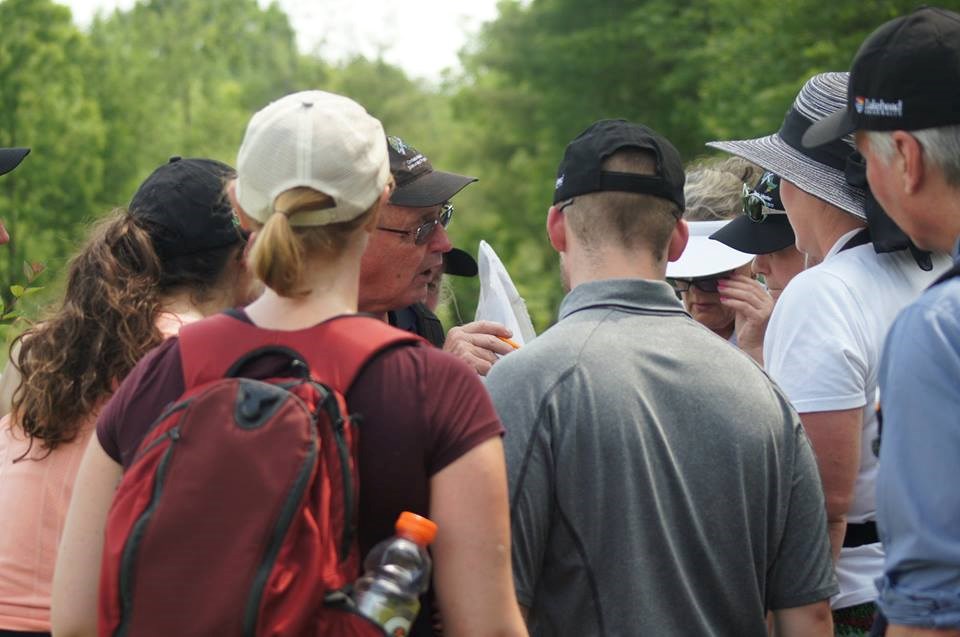On Sunday, in the sweltering heat, a dedicated cadre of 30 students completed their final module of a demanding program before joining a small, elite group of people who can call themselves Master Naturalists.
The graduates have completed the ground-breaking Ontario Master Naturalist Program – the only one of its kind in Canada. It was pioneered by renowned Orillia naturalist Bob Bowles, who developed the curriculum and leads the course. It is offered through Lakehead University in Orillia.
The students, from all over the province – some are biologists, teachers and outdoor educators, while others are doctors, nurses, businesspeople and youth – had to successfully complete eight full days of in-class studies and field trips during four weekends in May and June.
“There is a wide range of ages and backgrounds, but what they all have in common is a great desire to learn more about life around them in the environment,” said Bowles, who notes the students also must complete 30 hours of volunteer time with a not-for-profit organization on an environmental project to earn their certificate.
It’s not easy; the days are long, said Bowles, noting mornings are spent in the classroom where focused lectures are presented. Afternoons are spent in various places in and around Orillia on field trips.
This year marked the fourth class of graduates to complete the program; there are now more than 130 master naturalists who have graduated from the program.
Bowles has capped the class size at 30 for practical reasons. The course’s popularity means there is a long waiting list of students who want to participate.
“The course fills up within two days when we open registration in early December for the following spring program,” said Bowles. “We also do two winter workshops and four fall workshops every year where we cover a certain subject in depth” using a similar format.
The popular program is a labour of love for Bowles.
“This program was my brainchild and the first of its kind in Canada,” Bowles explained. “I developed it on my own with the courses and learning modules and brought in the very best experts to help me. The program is not only recognized in Ontario and Quebec but in the United States.”
He is proud of the legacy of the young program.
“I feel that we have created many advocates for nature that now better understand the different subjects,” said Bowles. “I think that I have changed some of the lives and goals by this program and I know that I have changed their regard and desire to learn more about nature which will make it a better world for some of the creatures involved that are coming under heavy human pressures with more people, more development and more roads.”
Graduates received their certificates which noted the subject areas they completed:
- Geology and anthropology;
- Ontario birds;
- Ontario mammals;
- Species at risk;
- Mushrooms, lichens, mosses and vascular plant study;
- Amphibians and reptiles;
- Invasive species;
- Wetlands, water and fish; and
- Insects and other invertebrates
While the class has ended, students will officially conclude their program this weekend when they participate in a “bio-blitz” at Georgian Bay National Park, where they will be tasked to gather scientific data for the park.
But the work for Bowles is far from over. In July, he will travel to Thunder Bay to head up the second year of a similar program he started in the northwestern Ontario city last summer. The program debuted with 15 participants, but Bowles expects to have a full class this year.
“The interesting thing about Thunder Bay is that some from southern Ontario, Quebec and the northern States are taking a week’s holiday to attend and spend their week in Thunder Bay, meeting new people and sharing a learning experience,” said Bowles.
Bowles has also fielded requests to expand the program to Guelph, Hamilton, Toronto and Sudbury and is considering ways to accommodate the demand.
While it’s a lot of work, involves countless hours of research and puts huge demands on his time, Bowles said he is “completely dedicated” to the program. He said every minute invested is worth it.
“If you could see their eager faces each morning … and their satisfied faces at the end of the day, you would understand what drives me to teach and improve this program every year,” Bowles told OrilliaMatters. “I know that they will change the world and improve the environment in some small way and I feel good being a part of that change.”
